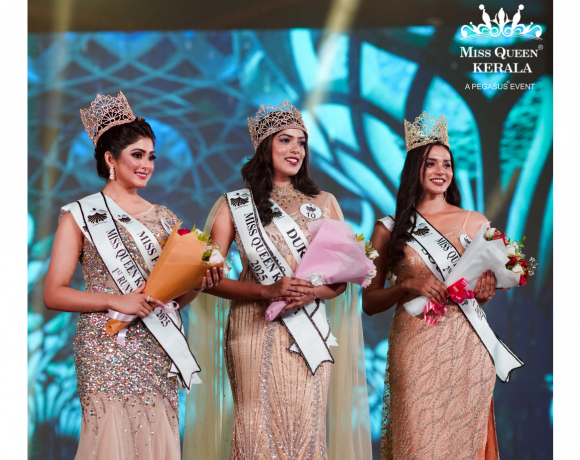
At the grand finale held on May 26th at Le Meridien, Kochi, Shwetha Jayaram from Kerala was crowned 14th Alcazar Watches & DQUE Miss Queen of India 2025, with Livya Liffy from Kerala securing the first runner-up spot and Kavya Bali from Jammu & Kashmir taking home the second runner-up title. The title winner was crowned by Pegasus Chairman Dr. Ajit Ravi and Jebitha Ajit, Managing Director of Pegasus Global Pvt. Ltd. The first runner-up was crowned by Sajan Varghese, Chairman & MD of SAJ Hotels and Resorts, and Dr. Jolly Antony, Chairman of Vibe Munnar and Managing Director of Fog Resort & Spa. Dr. G. N. Ramesh, Rotary Governor, and Major Ravi crowned the second runner-up.
This year’s competition welcomed 14 charismatic contestants representing the various Indian states. They underwent comprehensive grooming sessions by industry experts to prepare for the national stage. The competition was structured around three elegant rounds — a traditional round in lehenga, a contemporary western wear segment, and a final evening gown round.
Organized by Pegasus Global Pvt Ltd, the pageant stood apart as the only one in the nation to eliminate the bikini round, reinforcing its values of dignity and cultural representation. The Miss Queen of India platform serves as a gateway to global pageants such as Miss Asia, Miss Asia Global, and Miss Glam World.
Regional Title Winners
Miss Queen North – Ritu Roat (Rajasthan)
Miss Queen West – Rupvardhini Kumar Saste (Maharashtra)
Miss Queen East – Bhupali Modak (West Bengal)
Miss Queen South – Sanjana Akasam (Telangana)
Subtitle Winners
Miss Talent – Rupvardhini Kumar Saste (Maharashtra)
Miss Solidarity – Mayuri Mishra (Maharashtra)
Miss Fashionista – Ritu Roat (Rajasthan)
Miss Congeniality – Deepika Krishnamurthy (Karnataka)
Miss Ramp Walk – Livya Liffy (Kerala)
Miss Humaneness – Shwetha Jayaram (Kerala)
Miss Inspiring – Karishma Avinash Kadam (Maharashtra)
Miss Vivacious – Shwetha Jayaram (Kerala)
Esteemed personalities formed the judging panel, including Hari Anand, Harmeet Singh Gupta, Magen Fernandes, and Abhijeet Adurkar. Winners proudly wore gold crowns designed by Preeti Prakash of Parakkat Jewels, while subtitle awards were determined by a panel of distinguished evaluators.
The event was presented by Alcazar Watches and DQUE, with powered by partners including Manappuram Finance Ltd, Unique Times, Parakkat Resorts, SAJ Group Hotels & Resorts, and Green Media. Co-partners contributing to the success of the event were Kalpana International Salon & Spa, Aiswaria Advertisements, Europe Times, Times New, UT World, DQUE Soap, DQUE T-shirts, DQUE Watches, Unique Times, Akshay Inco, and JD Institute of Fashion Technology.
This year’s 14 contestants were:
Akshitha Sathyanarayana (Karnataka), Bhupali Modak (West Bengal), Deepika Krishnamurthy (Karnataka), Karishma Avinash Kadam (Maharashtra), Kavya Bali (Jammu & Kashmir), Livya Liffy (Kerala), Mayuri Mishra (Maharashtra), Meenakshi Unnikrishnan (Kerala), Ramyani Roysarkar (West Bengal), Ritu Roat (Rajasthan), Rupvardhini Kumar Saste (Maharashtra), Sanjana Akasam (Telangana), Shhukra Surryavanshi (Maharashtra), and Shwetha Jayaram (Kerala).
Pic Courtesy: Pegasus Photography











